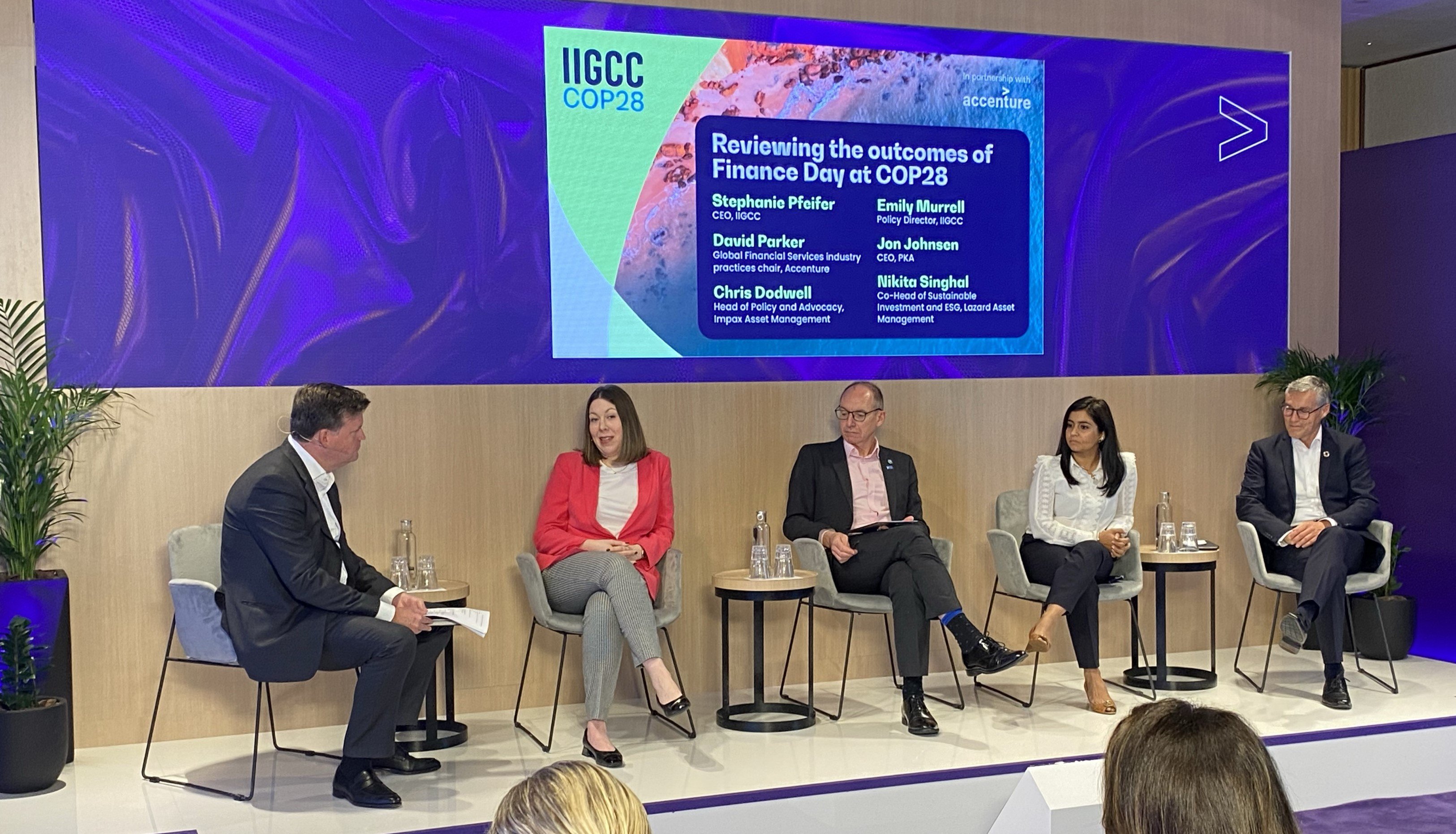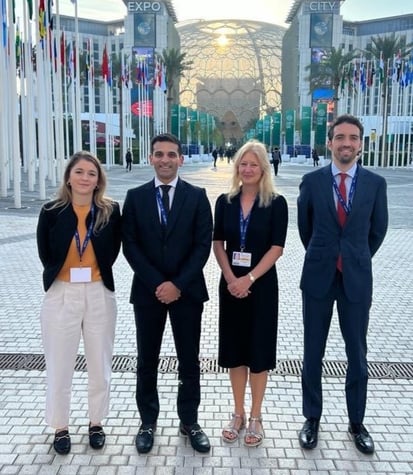
Callum Provan
Content Strategist
Investors called for policy collaboration on the finance, energy and built environment-themed days at COP28, delivered through resources, events and meetings. More broadly, the outcome of official negotiations remains uncertain as 7 December rest day marks the end of week one.
The Presidency is trying to balance differing perspectives on some of the thorniest, yet most consequential questions, including those around the future of fossil fuels. One thing is clear though - discussions in Dubai got off to a flying start.
The agenda was agreed in near-record time and COP28 President, Sultan Al-Jaber, also Chair of Abu Dhabi National Oil Company and CEO of its renewables arm, Masdar, operationalised the loss and damage fund for developing nations. The UAE pledged $100 million for the fund, followed by contributions from Germany and the rest of the EU, Japan, the USA and the UK.
For investors, events centred around 4, 5 and 6 December which included the finance, energy and industry, and built environment-themed days respectively. Our delegation was on the ground to represent members, helping to reiterate progress made on net zero commitments and a readiness to do more in a supportive policy environment.
A call for collaboration
On 4 December, IIGCC and nine other organisations delivered a call to action which aims to scale private capital mobilisation in aid of the UN’s sustainable development goals. The report highlights three key impediments to mobilising private capital and suggests solutions to address them.
"I was particularly pleased to see adaptation and resilience feature prominently, including our own call for greater collaboration between the private and public sector on how to close the investment gap."
Separately, a cross-section of non-state actors delivered a call for collaboration to mobilise private finance for adaptation and resilience, a topic which has featured heavily throughout the conference. IIGCC coordinated this call together with the UN Climate Change High Level Champions and other contributors including the United Nations Environment Programme Finance Initiative (UNEP FI) and the Insurance Development Forum.
Stephanie Pfeifer, IIGCC CEO noted this recurring theme at our investor event with Accenture on 5 December, which reflected on the finance day before:
“Cutting through the noise [of announcements], I was particularly pleased to see adaptation and resilience feature prominently, including our own call for greater collaboration between the private and public sector on how to close the investment gap.
“The international nature of COP with representatives from all corners of the world, including those most impacted by climate change today, highlights the importance of this topic but also the need for capital to be deployed at much greater speed and scale.”
Delivering the message
Across the week IIGCC delegates joined numerous meetings and events to emphasise the potential of private finance to support adaptation and resilience efforts. Stephanie and Jon Johnsen, CEO of PKA and Vice Chair of our Board, met with EU Commission Executive Vice President, Maroš Šefčovič to discuss the need for effective regulation as part of the EU Green Deal.
Hugh has been highlighting our new guidance to address whole life carbon in real estate portfolios, with IIGCC a member of the BuildingtoCOP coalition.
Stephanie also moderated the fourth UN Public-Private Sector Climate Finance Dialogue with Michael Button, IIGCC’s Real Economy Lead supporting the discussion. Adaptation and resilience were again central to the Marrakech Partnership for Global Climate Action event in support of the Sharm El Sheikh Adaptation Agenda, which Stephanie and Mahesh Roy, IIGCC Investor Strategies Programme Director both attended.
.jpg?width=648&height=460&name=Image%20(2).jpg)
Stephanie Pfeifer with Hiroshi Ozeki, President and CEO, Nissay Asset Management, David Neal, CEO IFM Investors, and Erick Decker, CIO, AXA Responsible Investments (left to right).
The Investor Agenda also held a side event focused on accelerating and scaling up investor action plans in aid of the Paris Agreement. Stephanie and Faith Ward, our chair of the Board and Chief Responsible Investment Officer at Brunel Pension Partnership joined fellow network partner leaders from PRI, CDP, UNEP FI and Ceres alongside speakers from the investment community.
On the built environment, Hugh Garnett, IIGCC Senior Policy Manager for Real Estate led a UN implementation lab on low carbon buildings and joined the launch of the Buildings Breakthrough, an initiative led by France and Morocco. Hugh has been highlighting our new guidance to address whole life carbon in real estate portfolios, with IIGCC a member of the BuildingtoCOP coalition.
Similarly, Danielle Boyd, Head of Climate Strategy Implementation, was busy in the resilience hub bringing public and private sector stakeholders together to facilitate much-needed dialogue. This included moderating a session on approaches to scaling up investment in adaptation and resilience with speakers from business and financial institutions.
Emily Murrell, IIGCC Policy Programme Director, joined an MSCi panel on the decarbonisation progress of G20 countries and listed companies alongside speakers from the UN, the White House and the private sector. Emily also spoke with edie media as part of its podcast from the event.
What next for week two?
The world now watches for the outcome of official negotiations. Despite that initial momentum, the President’s commitment was called into question on 3 December by footage in The Guardian, which quoted him as saying there was “no science” behind demands for the phase out of fossil fuels.
Responding alongside the Intergovernmental Panel Climate Change Chair and recent IIGCC keynote speaker, Professor Jim Skea, President Al Jaber stressed that he has often said that phase out is “inevitable” and that the quotes were taken out of context.
Separately, NGO Global Witness reported that a record 2,456 fossil fuel lobbyists are at COP28 – making them the third biggest delegation at the conference if they were one nation.
All of this context adds extra pressure to the Presidency’s energy policy ambitions, but they are progressing. The tripling of renewable capacity by 2030 has support from 120 countries already, according to Bloomberg. This, together with the doubling of energy efficiency by 2030 and a pledge on methane, would deliver three of the International Energy Agency’s five pillars for COP.
Investors watch on, with the outcomes of COP28 placing a huge influence on the macro policy environment on which net zero commitments depend.

IIGCC's Danielle Boyd, Mahesh Roy, Stephanie Pfeifer and Michael Button.
If you’d like to be the first to hear about IIGCC’s work at COP28 and access our webinars, insights and analysis, why not speak to our investor relations manager today to find out more about becoming a part of IIGCC?